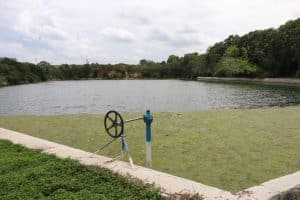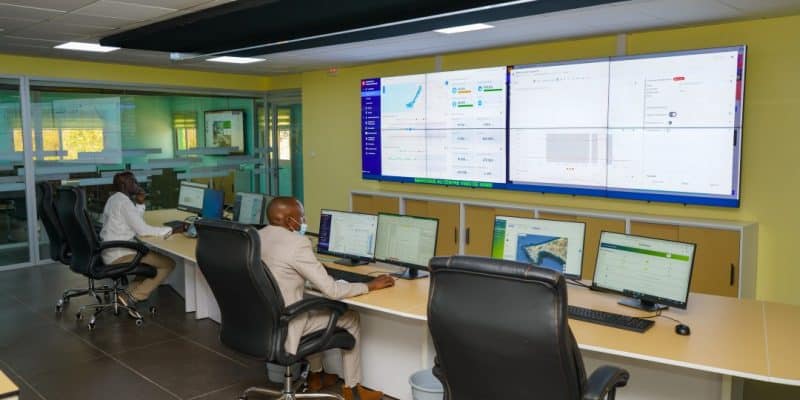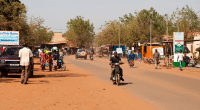At a time when Africa and the rest of the world are being severely affected by water stress, preserving available resources remains a sensible solution for supplying people with water. SUEZ, the water and waste management specialist, is setting an example by replenishing groundwater. This is a technique that could be of interest to coastal African cities faced with the intrusion of brackish water. At the same time, the Group is innovating in the management of water infrastructure and networks, particularly in Dakar, the capital of Senegal.
The cool of the morning gave way to a gentle heat at the site of the Pecq-Croissy drinking water production plant, which covers 50 hectares in the Yvelines division of France. On this particular day, technicians are busy working around the plant’s operations building, which treats water from the Seine. The principle is simple: to clarify the water from the river that flows through the French capital to recharge the groundwater in the Paris Basin.
Recharging the water table
The clarified water, freed of a very large proportion of micropollutants, is transferred to 12 hectares of ponds from which it seeps into the water table. For Karl Glucina, Director of Water Plants, Services and Innovation France at SUEZ, this operation means that the water is sustainable “in terms of quality and quantity, even during periods of drought”. According to him, these installations have a treatment capacity of 144,000 m3 per day and can inject an average of between 15 and 25 million m3 of water per year into the water table.

Recharging the water table at the Pecq-Croissy site in the Île-de-France region © Jean Marie Takouleu
When pumped back into the groundwater, this water is used by almost 1 million people in 60 municipalities in the Île-de-France region. As well as supplying drinking water, the Pecq-Croissy recharge site encourages biodiversity in flora and fauna. The recharge ponds are home to a large number of birds, with more than 70 species present.
A necessity in the face of climate change
As Alexandre Duzan, Director of Water Resources Innovations at SUEZ, points out, the controlled recharging of aquifers to compensate for falling groundwater levels has been “tried and tested since the 1950s, but it offers additional access to water resources in the face of global warming”. This phenomenon manifests itself in water stress, which particularly affects North Africa. Among the solutions being explored in this part of the continent is the reuse of treated wastewater for agricultural irrigation, and even for indirect drinking water supply by replenishing groundwater.
This technique also makes it possible to reduce saltwater intrusion into coastal areas. Saltwater intrusion affects the lives of many communities in Africa. According to Togolese researcher Mawulolo Yomo, the entire Gulf of Guinea is subject to a progressive invasion of seawater into coastal aquifers, with high salt levels observed in the surface aquifers of Togo’s coastal sedimentary basin, reducing the availability of fresh water.
The answer to the challenge of water management in Dakar
In addition to replenishing the water table, SUEZ provides a range of solutions to meet the challenges of water management in Africa. This is the case in Senegal, where the Group is involved in the distribution of drinking water in urban and peri-urban areas as the technical partner of reference for the Senegalese company SEN’EAU. Since 28 August, the public utility has been managed by Magatte Niang, a Senegalese who has worked in the water sector for 25 years.
SEN’EAU, which will benefit from this experience, has implemented the digital tool developed by SUEZ, “Aquadvanced® Ressources eau”, to accurately monitor the state of groundwater and the proper functioning of boreholes. This innovative tool makes it possible to analyse data in real time, anticipate potential problems and optimise maintenance operations in particular. It enables SEN’EAU to target borehole maintenance operations in order to increase productivity and reduce energy consumption.
SEN’EAU has also set up two digital decision-making tools for intelligent network management. These include the VISIO-Networks control centre, which provides a 360° view of the entire operation, from production to distribution, including the handling of customer requests and complaints. SEN’EAU has also equipped the Point B plant, the heart of the drinking water distribution system in Dakar, with a VISIO-Production centre.
This plant receives water from the plants in the north and from around a hundred boreholes, which follow the ALG (adduction from Lac de Guiers) to Dakar via the main reservoirs located in Thiès.

In Senegal, the VISIO centre provides a 360° view of the entire operation, from production to distribution of drinking water © SEN’EAU
For Sylvain Bedry, SEN’EAU’s technical expert, “the idea is to provide security and to be able to intervene without running out of water during operations on the distribution network. These operations involve, for example, renewing all the large-diameter valves, or isolating the reservoirs to clean them”.
To achieve its objectives, SEN’EAU has also undertaken to regenerate more than 25 boreholes a year and aims to increase this to more than 120 operations using the innovative Airgun® tool, which restores borehole productivity by removing obstructions. This SUEZ technology, which will be tested in 2022 and is currently being implemented, has the advantage of drastically reducing intervention times compared with traditional methods and of achieving significant unclogging, synonymous with an increase in the operating flow rate, while optimising energy consumption.
Article produced in partnership with SUEZ








You must be logged in to post a comment.